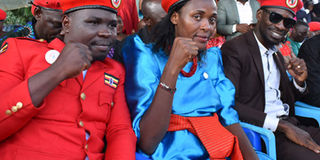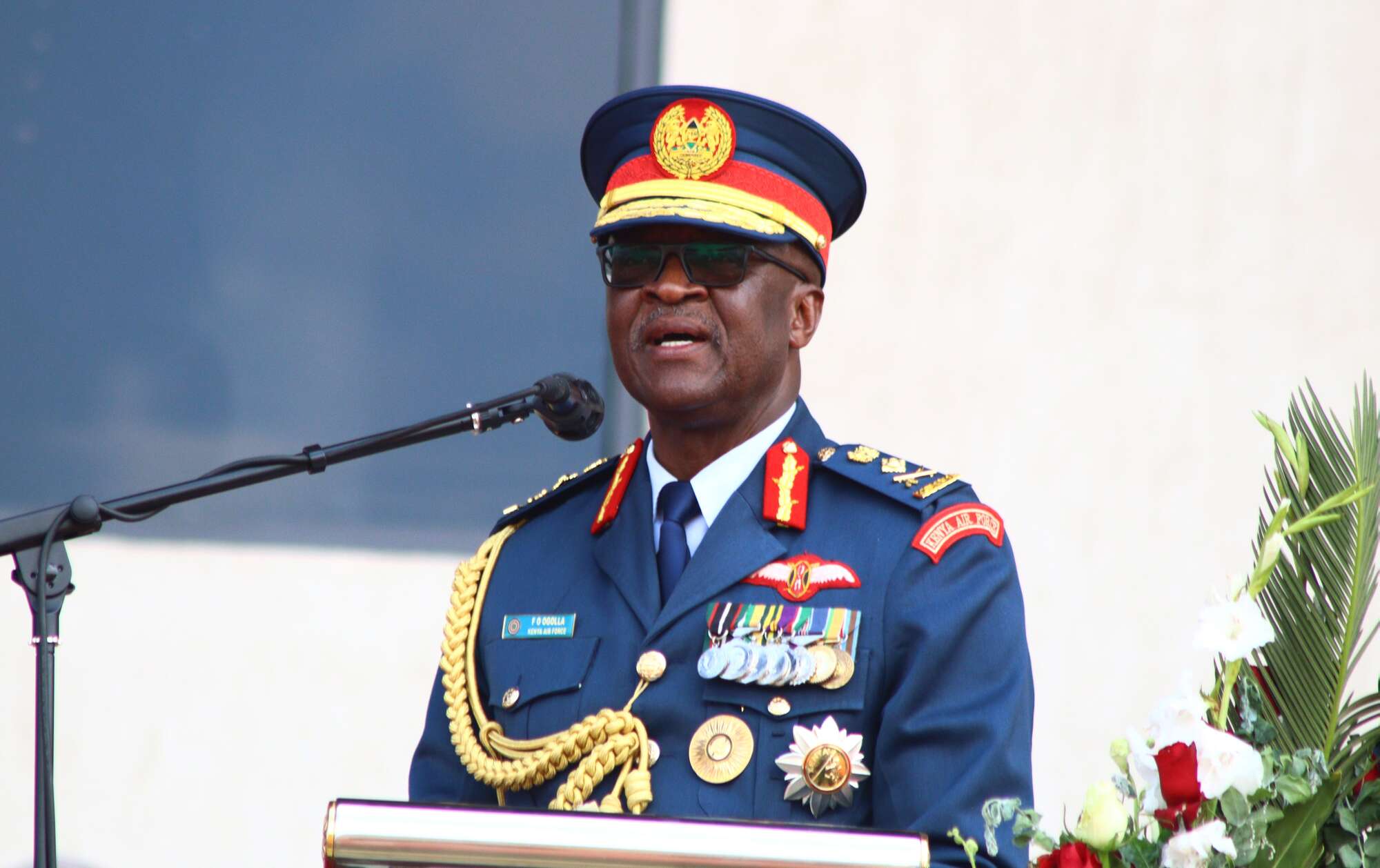People Power vow to defy army ban on red berets

Targeted. Mityana Municipality MP Francis Zaake (Left), former Hoima Woman parliamentary aspirant Asinansi Nyakato (Centre) and Mr Kyadondo East MP Robert Kyagulanyi alias Bobi Wine (Right) wear the red berets during campaigns in Hoima on September 24. PHOTO BY MICHAEL KAKUMIRIZI
What you need to know:
- The UPDF spokesperson, Brig Richard Karemire, however, insisted that the process of standardising the army uniform started way back in 1996 and it has also included five different head gears won by units within the forces.
Political pressure group People Power has vowed to continue using the red beret as their symbol despite a decision by the army to gazette it as a monopoly of the military.
People Power, a pressure group led by Kyadondo East MP Robert Kyagulanyi, alias Bobi Wine, has been wearing red berets and red overalls as their brand insignia for political activism seeking regime change.
Mr Joel Ssenyonyi, the People Power spokesperson, said they will not yield to the move by the UPDF to monopolise the red beret wear, adding that the army decision indicates that President Museveni is in panic mode.
“As far as we are concerned, this is just Gen Yoweri Kaguta Museveni who is in panic mode. I keep wondering why he keeps calling himself a general because he is such a coward and very fearful of People Power,” Mr Ssenyonyi said.
He added that the ban is a move by government to bring down the identity of People Power and other change-loving Ugandans.
Mr Ssenyonyi said they are ready to defy the ban and go to jail as none of them will abandon the dress code that has awakened the desire for change among Ugandans.
People Power’s resolve has been backed by former army commander and now leader of the Alliance for National Transformation (ANT) party, Maj Gen (Rtd) Mugisha Muntu, who said yesterday that the move is a sign that the army had been dragged into politics.
Gen Muntu warned that the army should avoid being dragged into politics.
“They are being dragged into a situation which I don’t know they would like to be in. But let us pray hard that we sort out the political problem, otherwise they are going to be stuck into an unnecessary conflict, because even in countries where UPDF is serving, there were armies. Even if they have done well in Somalia, Liberia, Central African Republic, they should know that those countries had armies that were great,” he said.
The former Bush War fighter said there is no way Ugandans can fail to differentiate between the red beret of the army and a red beret won on top of a red overall or civilian clothes by People Power supporters.
“It is unfortunate because the green is an army colour and one wonders whether they are going to stop people from wearing green clothes or caps. So, nobody can confuse the People Power red beret because it has nothing to do with the army and these can be differentiated from even 100 metres away,” Gen Muntu said.
The notice
Through gazette notice volume CXII Number 46 published on September 18, the army banned the wearing, making and selling of red berets.
“Members of the public are hereby informed that unless granted authority by a competent military authority, it is prohibited to sell, offer or expose for sale or use any uniform of the defence forces; manufacture, sell, offer or expose for sale, wear or use any uniform so nearly resembling the uniform of the Uganda People’s Defence Forces and like to deceive the public” the gazette seen by this newspaper reads in part.
Mr Peter Walubiri, a lawyer, said it is unlawful for the army to monopolise the red colour that has been won by political parties, especially the Uganda Peoples Congress, as early as the 1960s.
“The red colour is a campaign tool and snatching it away is disfranchising the people of Uganda. President Museveni is sending the people to war because it is a bad taste for him to monopolise these colours for his personal army. It is wrong; it is illegal,” Mr Walubiri said.
Mr Crispin Kaheru, the coordinator of the Citizens Coalition for Electoral Democracy, said: “The move is even weaker than the one [former president] Idi Amin pulled to ban wearing of mini-skirts.”
He said it is a poorly conceived move as the army will be seen as playing partisan politics.
The UPDF spokesperson, Brig Richard Karemire, however, insisted that the process of standardising the army uniform started way back in 1996 and it has also included five different head gears won by units within the forces.
Army responds
“The conclusion is a step towards the modernisation and professionalisation of the Force. Identification of forces will be easier thus enhancing command and control. Unauthorised use and access will be controlled,” Brig Karemire said.
“It is healthy to have a designated dress wear for institutions. We have great admiration and respect for the dress code of the clergy and Justices. The same ought to be extended to the Forces. It is not about innovating colours. It is about respecting items that are exclusive by law,” he added.



